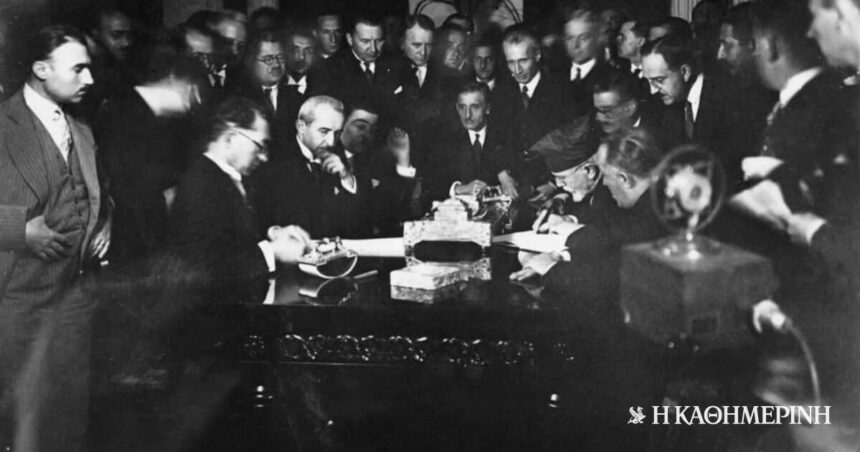This year marks the centenary of its signing Treaty of Lausanneone of the most important diplomatic agreements in History. During the World War Ithe allies promised to make them Turks leaders personally accountable for the genocide of Christians. But the Treaty of Lausanne of 1923 between the Allies and Turkey did the opposite, rewarding Turkey with more territory and legitimizing and facilitating its ethnic cleansing of the surviving Christians. Predictably, this encouraged the commission of more genocides and ethnic cleansing during the World War II.
The Treaty of Lausanne came about because the Turkish nationalists, led by Mustafa Kemal, refused to honor the original peace terms their government had signed. They continued to fight, drove out the allied occupation forces and completed the extermination of the Christians living in Asia Minor for millennia. The Germans, living under the burden of harsh Allied reparations, noted this. When the Hitler assumed power, he followed the example of the Turks. Disarm them Jews, branded them as dangerous interlopers, confiscated their property, moved them away from population centers to better cover the fate that awaited them, and then murdered them en masse. Other ethnic minorities were also forcibly displaced during and after World War II in an attempt to create religiously and ethnically homogeneous populations.
The lessons learned from the Treaty of Lausanne remain relevant. Without knowledge of past events, it is impossible to understand why they happened or how to prevent similar atrocities from happening in the future. The violence in the Middle East today is a typical example. Many features of the conflict between Israel and the Hamas they are reminiscent of the conflict that led to Lausanne. Hamas’ goals, strategy, propaganda, and religious fanaticism are eerily similar to those of Kemal’s nationalists.
Goals
Apologists for Turkey said they were waging a “war of independence” and called Kemal “George Washington Turk». The truth is that Turkish independence was never in danger. The treaty that preceded the Treaty of Lausanne also guaranteed Turkish sovereignty over most of Asia Minor. However, the nationalists wanted more land and wanted all the Christians in their area to be killed or expelled. They promised their supporters that they would determine “(Turkey’s) borders according to the degree of our strength and power” and continued to exterminate Turkey’s Christian minorities while negotiating the new treaty in Lausanne. And Kemal was no George Washington. He wanted power and didn’t want to share it. In two years from the signing of the Treaty of Lausanne, he had secured his monarchy and never surrendered it.
Similarly, Hamas does not fight for the freedom of Palestinians. Its inhabitants Gaza they elected Hamas to power 17 years ago and they have never allowed another election. Muslims living in Israel they have more freedom than those living under Hamas rule. Anyone who “longs to breathe freely” would be better off in Israel, the region’s only democracy in a vast sea of neighboring countries controlled by Muslim governments with no religious freedom or guaranteed civil liberties. In short, Hamas is fighting for what the Turks were also fighting for: territories and the extermination of all non-Muslims in them.
Strategy
Hamas cannot now defeat Israel militarily, but hopes to achieve victory by isolating it. He wants other states to contain Israel and force it to negotiate. Accordingly, a hundred years ago, Kemal’s Turkish nationalists were no match for allies militarily, but managed to secure victory by isolating their most important military rival: Greece.
All the allied forces in Asia Minor clashed with Kemal’s nationalists: the Greeks in Smyrna (5/1919), the French in Maras (2/1920), the British in Izmit (6/1920) and the newly established Armenian Republic (9/1920). But the allied forces were mostly Greek, because the American, British and French troops were occupying Germany. Allied leaders asked Greece to send troops to Asia Minor. She willingly accepted, wanting to protect the Greeks who were terrorized by the Turks before and during the war, but also hoping to secure lands around the Smyrna (today Izmir), where at that time three times more Greeks lived than in Athens.
From 1919-1920, the Greeks won victories against the nationalist forces in Thrace, Ionia and near Constantinople. To reverse his fortunes, Kemal had to divide the allied forces. Sowing discord among Western states has been a staple of Turkish diplomacy for centuries, and it worked again. The Italians, believing they had not been adequately compensated for their war effort, betrayed their former partners and aided Kemal. France, jealous of British influence and suffering from the massacres of French forces by the Turks, also switched sides. THE Russiawhich was now controlled by Bolsheviks and would gladly attack the powers of the West, she also gave her support to Kemal. Britain then turned its back on Greece, believing it needed France and the Italy as allies rather than the Greeks (a view that was proven wrong during World War II)! Finally, the United States did the same, leaving Greece completely isolated.
Many features of the conflict between Israel and Hamas are reminiscent of the conflict that led to Lausanne. Hamas’s goals, strategy, propaganda and religious fanaticism are eerily similar to those of Kemal.
Nevertheless, the Greek forces alone came a breath away from defeating the nationalists. At the climax of his three-day battle Sangario in 1921, Greek forces fought hard against entrenched Turkish positions until they ran out of ammunition and were forced to retreat. With Greek coffers empty and no allied loans, Turkish forces were now winning. If the allies had helped supply Greece, or if they had simply neglected to help Kemal, the situation would probably have turned out the other way around. The same is true of Israel’s current conflict. Western nations hurt Israel by easing sanctions on Iran, allowing it to finance Hamas terrorism, and are now pressuring Israel to stop military operations. Like little Greece, so too little Israel must maintain at least the passive support of its allies. Otherwise, he will not be able to prevail in what will surely be an ongoing battle.
Propaganda
The outrageous propaganda laid the foundations for Turkish diplomacy, which forced the withdrawal of the Greek forces. Kemal accused the allies of committing genocide against Muslims, when in fact the exact opposite was true. By the time the Treaty of Lausanne was signed on July 24, 1923, the Turks had massacred 1.5 to 2.5 million Christians and forced even more to flee for their lives. Accordingly, Hamas propaganda inverts reality, blaming Israel for the genocide committed by Hamas. Hamas brags about what it does and even videos the murders, rapes, beheadings, mutilations and burning alive of innocent Israeli citizens, even babies. It then uses civilians as shields during Israel’s defense operations to inflict casualties on its own population.
Turkish nationalists and Hamas also distort their intentions. Kemal’s propagandists told the world that their slogan, “Turkey for the Turks,” meant they wanted freedom and freedom from foreign rule. Hamas apologists also claim that its slogan is a call for freedom. “From the river to the sea, Palestine will be freed.” But, as Hamas leaders admit, it means exactly what Kemal’s slogan means: the complete elimination of every non-Muslim state and its population from the area they are eyeing. They promise to keep attacking until Israel and Israelis are no more. Despite the patently false accounts of its motives and methods, Hamas has fooled many, just as the Turks did a century ago.
Religious fanaticism
Another similarity that cannot go unnoticed is the utter sadism of Turkish nationalists and Hamas. The Turks murdered, raped and terrorized their victims with unspeakable cruelty, and Kemal also encouraged the atrocities, making sure that “the most bloodthirsty Turks received the greatest rewards”:
Many of the massacred Christians were murdered with knives, bayonets, axes and stones, thousands were burned alive…, tens of thousands of women and girls were gang-raped and murdered, clergymen were crucified and thousands of Christian officials were tortured – they had their eyes gouged out, their noses and ears cut off, their they mashed the legs – before they were executed.
“Turkish Muslim clerics and clerics were prominent among the killers, and jihadist rhetoric was prevalent, if not dominant, in sermons, billboards, and the Turkish press” (all quotes from the most authoritative historical account of the Asia Minor devastation: The Thirty Year Genocide: Turkey’s Destruction of Its Christian Minorities, 1894-1924 (“The Thirty Years’ Genocide: The Annihilation of Turkey’s Christian Minorities, 1894-1924» of Benny Morris and Dror Ze’evi, ed. Patakis).
Many features of the conflict between Israel and Hamas are reminiscent of the conflict that led to Lausanne. Hamas’s goals, strategy, propaganda and religious fanaticism are eerily similar to those of Kemal.
Western leaders are concerned about the “Islamophobia”, however, it is the Christians of Africa, the Middle East and other Muslim countries who are usually persecuted, burned and burned to death, not the other way around. No one wants to blame an entire religion, but the more one knows about history, the harder it is to avoid the conclusion that Islam plays a role in the savagery of Hamas, just as it did with the Turks. Perhaps the belief that non-Muslims are inherently of inferior status and worth is the first step in dehumanizing the victims of atrocities.
“In a war the truth is always the first casualty,” said Aeschylus. Perhaps the reverse is true, and the first step to peace is accepting the truth. In the case of the Middle East, the truth about the Lausanne Treaty is a good place to start. The Western allies should not have abandoned their democratic ally, Greece, in favor of the authoritarian Kemal. Nor should they abandon democratic Israel as it fights for its survival. If we want a world without genocides, we must stop rewarding them and start punishing those who commit them. This is achieved by leaving the Israelis to fend for themselves. The motto we must adopt is not “From the river to the sea” but “Never again” – meaning, never again to reward genocide or engage in the two-faced diplomatic maneuvers that enable it.
*Ms. Ismini Lamb is director of the Modern Greek Studies Program at Georgetown University and authored the biography of George Horton: The Gentle American: George Horton’s Odyssey and His True Account of the Smyrna Catastrophe (Gorgias Press).




